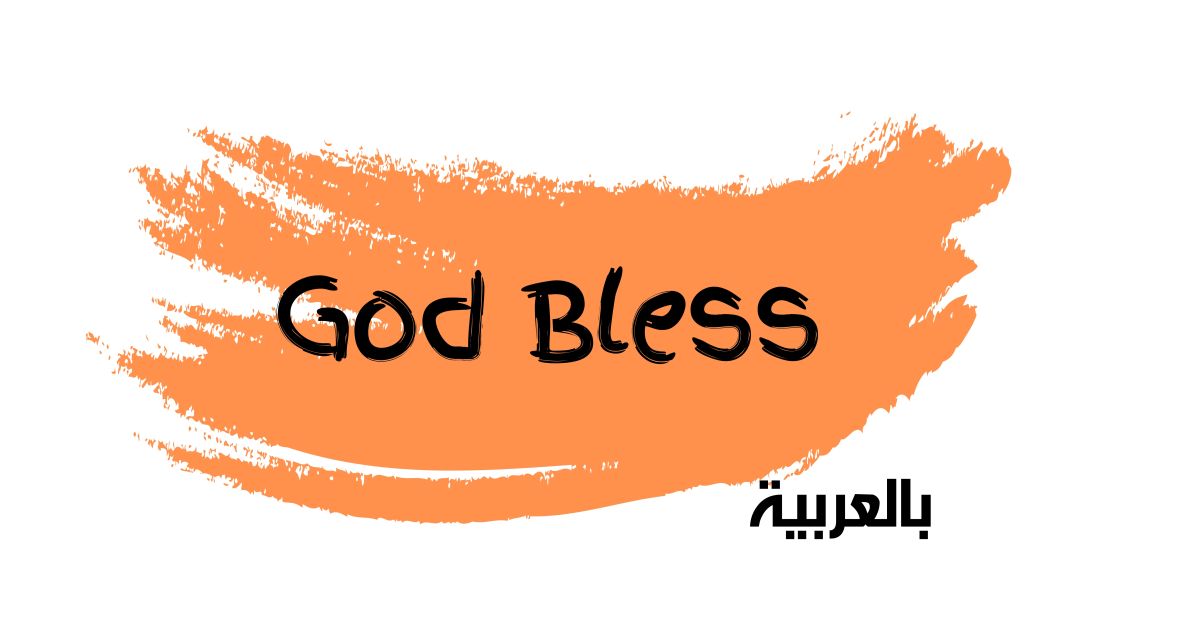Allah / God Bless You In Arabic Language
Table of Contents
ToggleArabic is a rich and expressive language spoken by millions worldwide. Among the phrases that hold special significance in Arabic is “God bless you,” a term often used to convey good wishes and blessings. Whether you’re learning Arabic to deepen your understanding of the Quran, communicate with Arabic speakers, or explore the culture, phrases like these are vital. In this article, we’ll dive into how to say “God bless you” in Arabic, when to use it, and how to respond, with tips on pronunciation and resources to master the language.
How Do You Say God Bless You in Arabic
The most common way to say “God bless you” in Arabic is بارك الله فيك (Barak Allahu Fik), which translates to “May Allah bless you.” This expression is deeply rooted in Islamic culture and is often used to express gratitude, goodwill, or as a response to kindness.
Another variation commonly used in daily conversations is جزاك الله خيراً (Jazak Allahu Khairan), which means “May Allah reward you with goodness.” This phrase is typically used when someone does something beneficial for you.
Both expressions carry profound meanings and reflect the emphasis on blessings and rewards in Islamic teachings.
May Allah Bless You in Arabic
In Arabic, the phrase “May Allah bless you” can also be said as الله يبارك فيك (Allah Yubarik Fik). This version is often used in prayers and formal settings. Additionally, there are variations depending on the gender and number of people being addressed:
- For a male: بارك الله فيك (Barak Allahu Fik).
- For a female: بارك الله فيكِ (Barak Allahu Fiki).
- For a group: بارك الله فيكم (Barak Allahu Fikum).
These expressions not only convey blessings but also demonstrate the depth and adaptability of Arabic in addressing different contexts.
When to Say God Bless You in Arabic
“God bless you” is a versatile phrase used in various situations in Arabic-speaking cultures. Here are some common scenarios:
- After someone sneezes: Similar to “bless you” in English, يرحمك الله (Yarhamuk Allah) is said after someone sneezes, meaning “May Allah have mercy on you.”
- Expressing gratitude: When someone helps you or offers kindness, saying بارك الله فيك is a way to show appreciation.
- In prayers: The phrase is often included in prayers for someone’s health, success, or well-being.
- Congratulating others: In moments of joy, like weddings, graduations, or new achievements, Arabs use this phrase to wish blessings.
Reply to God Bless You in Arabic
Responding to “God bless you” in Arabic depends on the specific phrase used. Common replies include:
- For بارك الله فيك (Barak Allahu Fik): You can say وفيك بارك الله (Wa Fika Barak Allah), meaning “And may Allah bless you too.”
- For جزاك الله خيراً (Jazak Allahu Khairan): The reply is وإياك (Wa Iyyak), meaning “And you as well.”
- For الله يبارك فيك (Allah Yubarik Fik): Respond with آمين (Ameen), which means “Amen.”
Mastering these replies enhances your conversational skills and shows respect for cultural norms.
How to Pronounce God Bless You in Arabic
Pronunciation is crucial when learning Arabic phrases. Below is a guide to pronouncing “God bless you” in Arabic:
- Barak Allahu Fik: Baa-raak Allah Fee-k
- Jazak Allahu Khairan: Ja-zaak Allah Kha-yran
- Allah Yubarik Fik: Aal-lah Yoo-baa-rik Fee-k
To perfect your pronunciation, you can practice with native Arabic speakers or enroll in an Arabic Conversation Course at Mishkah Academy.
Join Arabic Conversation Course
At Mishkah Academy, we offer specialized courses designed to help learners speak Arabic fluently. Our Arabic Conversation Course focuses on building practical skills, teaching essential phrases, and enhancing your confidence in speaking Arabic. By joining this course, you’ll not only learn how to say “God bless you” but also master other commonly used expressions.
Advantages of Learning Quran & Arabic Online at Mishkah Academy
Mishkah Academy provides unparalleled opportunities to learn Arabic and Quran online. Here’s why students choose us:
- Expert Tutors: Learn from certified native Arabic-speaking tutors who understand your needs.
- Flexible Scheduling: Classes are tailored to fit your schedule, making it easier to balance learning with daily responsibilities.
- Interactive Lessons: Engage in real-time discussions and practice conversations with expert instructors.
- Affordable Fees: Enjoy high-quality education at reasonable prices.
- Comprehensive Curriculum: Whether you’re a beginner or advanced learner, our programs are customized to suit your proficiency level.
Discover the benefits of online learning by booking a Free Trial Lesson today.
How to Enroll
Enrolling in courses at Mishkah Academy is simple and convenient:
- Visit our website.
- Explore our range of courses, including the Arabic Conversation Course.
- Register for a Free Trial Lesson to experience our teaching methods firsthand.
- Choose your preferred course and schedule based on your learning goals.
Conclusion
Learning to say “God bless you” in Arabic is a beautiful way to connect with the language, culture, and Islamic traditions. Whether you’re using the phrase in daily conversations, prayers, or formal settings, mastering its variations and replies is essential. By enrolling in the Arabic Conversation Course at Mishkah Academy, you’ll gain the skills to communicate confidently and deepen your understanding of Arabic. Start your journey today with a Free Trial Lesson and experience the joy of learning a new language.
Let Mishkah Academy be your guide to fluency and cultural connection!
FAQs “How To Say May God/Allah Bless You in Arabic”
1. How do you say “May Allah bless you” in Arabic?
The phrase “May Allah bless you” in Arabic is commonly said as بَارَكَ اللّٰهُ فِيكَ (BarakAllahu Feek) for males or بَارَكَ اللّٰهُ فِيكِ (BarakAllahu Feeki) for females. It is a supplication asking for Allah’s blessings.
2. What does “BarakAllahu Feek” mean?
“BarakAllahu Feek” translates to “May Allah bless you.” It is a way of expressing gratitude, appreciation, or wishing someone well in a spiritual context.
3. Are there other ways to say “May God bless you” in Arabic?
Yes, here are a few alternatives:
- اللّهُمَّ بَارِك (Allahumma Barik): “O Allah, bless.”
- جَزَاكَ اللّٰهُ خَيْرًا (JazakAllahu Khayran): “May Allah reward you with goodness.”
- رَحِمَكَ اللّٰهُ (RahimakAllah): “May Allah have mercy on you.”
4. Is “May Allah bless you” used only among Muslims?
While the phrase is rooted in Islamic tradition, it is used culturally by Arabic-speaking Muslims and non-Muslims alike to express goodwill or blessings, often reflecting the linguistic and spiritual traditions of the region.
5. Can “May God bless you” be translated for Christian Arabs?
Yes, Christian Arabs often use رَبِّنَا يُبَارِك فِيكَ (Rabbina Yubarik Feek) or اللّٰه يُبَارِك فِيكَ (Allah Yubarik Feek), which also mean “May God bless you.” The term “Allah” simply means “God” in Arabic and is used by Christians and Muslims alike.
6. When is it appropriate to say “May Allah bless you” in Arabic?
You can say it in various contexts, such as:
- Expressing gratitude: e.g., when someone helps you.
- Offering well-wishes: e.g., at weddings, birthdays, or other happy occasions.
- During prayers for someone’s health, success, or happiness.
7. How do you respond to “BarakAllahu Feek”?
The typical response is وَفِيكَ بَارَكَ اللّٰهُ (Wa Feek BarakAllahu) or وَفِيكِ بَارَكَ اللّٰهُ (Wa Feeki BarakAllahu) for females, which means “And may Allah bless you too.”
8. Why is the phrase “May Allah bless you” significant in Arabic culture?
It is significant because it reflects a deep connection to faith, spirituality, and the Arabic-speaking culture’s emphasis on blessings, gratitude, and invoking divine favor in daily interactions.
9. Can I use this phrase in writing or formal communication?
Yes, “May Allah bless you” or its Arabic equivalent is often used in formal letters, emails, or messages, especially when addressing someone in a spiritual or respectful tone.
10. Are there any common phrases related to “May Allah bless you”?
Here are a few:
- الحَمْدُ لِلّٰهِ (Alhamdulillah): “Praise be to Allah.”
- سُبْحَانَ اللّٰه (SubhanAllah): “Glory be to Allah.”
- إِنْ شَاءَ اللّٰه (InshaAllah): “If Allah wills.”
These FAQs can enrich your article, making it more informative and engaging for readers interested in learning about Arabic phrases and cultural expressions.






